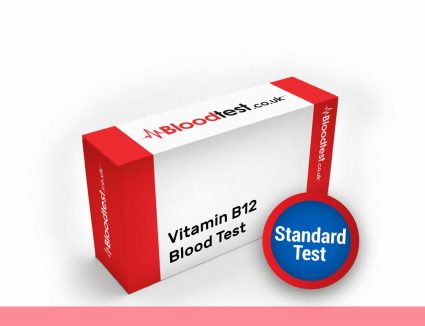Gain In-Depth Knowledge About Vitamin B12 Deficiency and Its Implications
Identify the Critical Symptoms Indicating Vitamin B12 Deficiency

When contemplating a Vitamin B12 Blood Test in Irvine, it is essential to recognise that a vitamin B12 deficiency can present itself through a range of subtle and pronounced symptoms that may develop gradually and go unnoticed. Common indicators include persistent fatigue and weakness, which individuals may mistakenly attribute to everyday stressors or lack of sleep. Neurological manifestations often accompany a B12 deficiency, such as numbness and tingling sensations, particularly in the extremities, a condition referred to as peripheral neuropathy. This arises due to impaired nerve function, leading to feelings of disorientation or physical frailty. As the deficiency persists, cognitive issues, including memory loss and difficulties with concentration, may become evident, signalling an urgent need for medical evaluation and intervention.
In addition to the physical symptoms, the psychological ramifications of a B12 deficiency can be quite profound. Individuals may experience emotional instability, including mood swings, signs of depression, and heightened levels of anxiety. Early recognition of these symptoms is critical, as neglecting them may result in more severe health complications. A thorough understanding of these warning signs equips individuals to seek prompt medical assistance, thereby safeguarding their health and enhancing their overall vitality.
Prefer to Listen Rather Than Read? Access Our Audio Guide!
 Exploring the Root Causes of Low Vitamin B12 Levels
Exploring the Root Causes of Low Vitamin B12 Levels
A multitude of factors can lead to low vitamin B12 levels, making it imperative to accurately identify the underlying causes. One of the primary reasons is inadequate dietary intake, particularly among those who do not consume sufficient animal-based foods, as B12 is predominantly found in sources like meat, fish, eggs, and dairy products. Consequently, individuals adhering to vegetarian or vegan diets may be particularly susceptible unless they incorporate fortified foods or suitable supplements into their eating plan.
Another significant contributor to low B12 levels is pernicious anaemia, an autoimmune disorder that inhibits the body’s ability to produce intrinsic factor, a vital protein necessary for the absorption of B12 in the intestines. Furthermore, certain medications, including proton pump inhibitors and metformin, can hinder B12 absorption; these drugs are often prescribed for conditions such as heartburn and diabetes, respectively. Identifying these factors enables individuals to make targeted dietary adjustments and engage in more effective discussions with healthcare providers regarding treatment options.
The Importance of Timely Detection of B12 Deficiency
Recognising and addressing vitamin B12 deficiency early is crucial for preventing irreversible neurological damage and enhancing overall health outcomes. The longer the body is deprived of this essential vitamin, the greater the risk of developing severe complications such as cognitive decline and permanent nerve damage. Regular screenings and a proactive awareness of symptoms are vital for identifying deficiencies before they escalate into more serious health issues.
Moreover, timely intervention can significantly improve an individual’s quality of life. Individuals who take proactive measures to address their B12 deficiency early often report a swift increase in energy levels and overall well-being. By understanding the significance of early detection, individuals can actively protect their health through routine medical check-ups and informed dietary decisions.
Evaluating Effective Treatment Approaches for Vitamin B12 Deficiency

Addressing vitamin B12 deficiency typically necessitates a comprehensive treatment strategy tailored to the specific needs of each individual. Treatment options may encompass B12 supplements, dietary modifications, or, in more severe cases, injections. For individuals with mild deficiencies, oral supplements can be effective in maintaining B12 levels through adjustments in diet and lifestyle.
Implementing dietary changes can play a pivotal role in recovery. By increasing the intake of B12-rich foods, such as meat, fish, poultry, eggs, and dairy products, individuals can naturally replenish their B12 levels. Those following restricted diets should seek out fortified foods, including specialised breakfast cereals and plant-based milks, to meet their nutritional needs without compromising their dietary preferences.
For individuals with more pronounced deficiencies, B12 injections administered by healthcare professionals may be required. This method allows for a rapid restoration of B12 levels, particularly in situations where absorption is impaired. Regular follow-up appointments are essential for monitoring progress, ensuring treatments remain effective, and making necessary adjustments as needed.
Essential Preparatory Steps for Your Vitamin B12 Blood Test
Comprehensive Insights into the Vitamin B12 Testing Procedure
Preparing for a vitamin B12 blood test is generally a straightforward process. Typically, it involves a simple blood draw that lasts only a few minutes. This procedure is conducted in a clinical environment, where a qualified healthcare professional collects a small blood sample from a vein in your arm. Most patients report the experience as relatively painless, with only brief and minimal discomfort.
After the test, individuals can usually return to their normal activities without any delay. The blood sample is sent to a laboratory for analysis to determine your B12 levels. While the testing process itself is quick, the results may take several days to be processed. Understanding the simplicity of this testing procedure can help alleviate anxiety about the process and encourage proactive health management.
Understanding Fasting Requirements for the Vitamin B12 Blood Test

When preparing for a vitamin B12 blood test, it is crucial to follow any specific instructions provided by your healthcare provider, which may include potential fasting guidelines. While most vitamin B12 tests do not typically require fasting, specific protocols may vary based on individual circumstances or any concurrent tests that may be conducted.
Fasting generally involves abstaining from consuming anything other than water for a designated period before the test. Adhering to these guidelines is vital to ensure the accuracy of the test results, as food intake can interfere with the measurement of various blood components. If there is any uncertainty, it is advisable to consult your healthcare provider to clarify any fasting requirements applicable to your situation, ensuring a seamless testing experience.
Choosing the Optimal Location for Your Vitamin B12 Test
Selecting a reputable clinic or laboratory for your vitamin B12 blood test is essential for obtaining accurate and reliable results. Conduct thorough research on local healthcare facilities to identify those with positive reviews and recommendations from trustworthy sources. Consider the convenience of the location and the professionalism of the staff, as these factors can significantly affect your testing experience.
Numerous clinics and hospitals across the UK offer comprehensive blood testing services, frequently with the added convenience of online booking options. It is crucial to ensure that your chosen facility is accredited and has a solid reputation for reliability. A well-selected testing location can provide peace of mind and contribute to a smooth healthcare experience.
Interpreting and Understanding Your Vitamin B12 Test Results
Identifying Normal Vitamin B12 Levels for Optimal Health
Interpreting your vitamin B12 test results requires a clear understanding of what constitutes normal levels. Generally, B12 levels exceeding 200 pg/mL are regarded as adequate; however, optimal ranges may vary slightly amongst laboratories. Being aware of these variations is essential for both patients and healthcare providers to facilitate accurate assessments.
If your results fall within the normal range, it typically signifies that your B12 levels are sufficient to support critical bodily functions, including DNA synthesis and red blood cell production. Maintaining these levels is vital for overall health and well-being. Regular monitoring and vigilance regarding symptoms can help prevent deficiencies from recurring, especially in populations that are at higher risk.
Understanding the Implications of Low Vitamin B12 Results
A result that falls below the normal range may indicate a vitamin B12 deficiency, necessitating further investigation. When confronted with low B12 levels, consulting your healthcare provider is imperative to explore potential underlying causes, such as dietary deficiencies, absorption issues, or medical conditions like pernicious anaemia.
Your healthcare provider may recommend additional tests or evaluations to gain a comprehensive understanding of the root cause of the deficiency, allowing for a tailored treatment plan. Being proactive in addressing low results can prevent the worsening of symptoms and diminish the risk of long-term health complications. Early engagement with healthcare professionals is crucial for effective management and recovery.
Strategising Your Next Steps After Testing
Following your vitamin B12 test, discussing the results with your doctor is essential. Based on your individual situation, they can offer valuable insights into whether treatment or additional testing is necessary. Open communication regarding any symptoms you may be experiencing can assist your healthcare provider in determining the most appropriate course of action.
If your results indicate a deficiency, your doctor may recommend a personalised treatment plan that could include dietary modifications, supplementation, or more intensive interventions such as injections. Regular follow-up tests will likely be advised to monitor your progress and ensure that your B12 levels remain stable and within the optimal range. This proactive approach is crucial for maintaining long-term health and well-being.
Comprehensive Treatment Strategies for Vitamin B12 Deficiency
Implementing Dietary Changes to Combat B12 Deficiency
Making informed dietary adjustments is often essential in addressing vitamin B12 deficiency. Increasing the consumption of B12-rich foods can significantly elevate levels and improve overall health. Foods such as meat, fish, poultry, eggs, and dairy serve as excellent sources of B12. For those adhering to vegetarian or vegan diets, it is crucial to consider incorporating fortified foods, like specific breakfast cereals and non-dairy milks, to adequately satisfy their nutritional needs.
Understanding the multifaceted role of vitamin B12 in bodily functions can motivate individuals to implement these dietary changes. B12 is essential for nerve function, red blood cell production, and DNA synthesis, emphasising its significance in supporting overall health. Engaging with a nutritionist can provide personalised guidance on optimally incorporating B12-rich foods into your diet.
In addition to selecting appropriate foods, it’s vital to be mindful of cooking methods. Certain cooking techniques can reduce vitamin content, so opting for steaming or grilling instead of boiling can help preserve B12 levels. By prioritising B12-rich foods and adopting thoughtful cooking practices, individuals can make substantial progress toward improving their health and correcting deficiencies.
Utilising Supplements and Injections as Effective Treatment Strategies
For individuals diagnosed with vitamin B12 deficiency, the incorporation of supplements or injections may be necessary. Oral supplements are a common treatment option, easily integrated into daily routines. Depending on the severity of the deficiency, healthcare providers may recommend various dosages to ensure effective replenishment of B12 levels.
In cases of severe deficiency or when absorption issues arise, B12 injections may be recommended. These injections deliver the vitamin directly into the bloodstream, bypassing potential digestive absorption barriers. The frequency and dosage of the injections will depend on individual needs and should be monitored by a healthcare professional to guarantee optimal results.
Ongoing monitoring and follow-up tests are critical after treatment commences. Regular evaluations allow healthcare providers to assess the effectiveness of the chosen treatment method and ensure that B12 levels stabilise appropriately. By remaining engaged in the treatment process, individuals can enhance their health outcomes and overall quality of life.
The Importance of Monitoring and Follow-Up for Sustaining Healthy B12 Levels
Routine follow-up tests are essential for ensuring the effectiveness of treatment for vitamin B12 deficiency. Monitoring B12 levels empowers healthcare providers to make informed decisions regarding ongoing treatment plans, including whether to continue supplements, adjust dosages, or explore alternative therapies.
Being proactive in follow-up appointments is crucial for individuals at risk of deficiency or with a history of low B12 levels. These regular check-ups can help identify any potential issues early, enabling timely intervention. Patients should maintain open communication with their healthcare providers, discussing any new symptoms or concerns to ensure comprehensive care.
Incorporating lifestyle modifications, such as improved dietary habits and regular physical activity, can also aid in maintaining healthy B12 levels. Taking a proactive approach to health management can yield long-term benefits, enhancing overall well-being and reducing the chances of future deficiencies.
Incorporating Fortified Foods to Fulfil B12 Requirements
Integrating fortified foods into your diet can significantly assist in meeting your vitamin B12 requirements, particularly for individuals with dietary restrictions. Numerous products, such as breakfast cereals, plant-based milks, and nutritional yeast, are fortified with B12, offering a convenient source for those who may not consume adequate animal products.
When selecting fortified foods, it’s essential to read labels carefully to understand the B12 content and ensure they meet daily nutritional needs. Fortified foods can play a pivotal role in reducing the risk of deficiency, especially among vegetarians and vegans who may struggle to obtain sufficient B12 from natural sources.
Incorporating these foods into daily meals can also increase variety and enjoyment in the diet. For instance, adding fortified plant-based milks to smoothies or using nutritional yeast as a seasoning can not only boost B12 intake but also introduce exciting flavours and textures. Emphasising the role of fortified foods in meal planning can empower individuals to take control of their nutritional health effectively.
The Multifaceted Influence of Vitamin B12 on Overall Health
The Role of B12 in Supporting Optimal Nervous System Function
Vitamin B12 is fundamental to maintaining the health of nerve cells, which is essential for optimal neurological function. This vital nutrient plays a key role in producing myelin, the protective sheath surrounding nerves, facilitating effective communication between the brain and the body. When there is an insufficient supply of B12, nerve function may be compromised, leading to sensations of numbness, tingling, and impaired coordination.
Research has demonstrated a clear connection between vitamin B12 levels and cognitive function. Deficiencies can contribute to neurodegenerative conditions and cognitive decline, underscoring the necessity of maintaining adequate B12 levels throughout life. Individuals experiencing symptoms such as memory loss or confusion should consider having their B12 levels assessed, as early intervention can significantly mitigate the risk of irreversible neurological damage.
Moreover, B12’s impact on mood regulation is noteworthy. Low vitamin levels have been associated with an increased likelihood of depression and anxiety. By ensuring optimal B12 levels, individuals can support not only their physical health but also enhance their emotional well-being, highlighting the multifaceted advantages of this essential nutrient on overall health.
The Essential Contribution of B12 to Red Blood Cell Formation
Vitamin B12 is crucial for the production of red blood cells, as it plays a vital role in synthesising the DNA required for their formation. A deficiency in B12 can hinder red blood cell production, leading to anaemia, characterised by symptoms such as fatigue, weakness, and pallor. This condition can significantly impact an individual’s quality of life and overall health.
Proper red blood cell production is essential for effectively transporting oxygen throughout the body, ensuring that tissues and organs function optimally. When B12 levels are inadequate, the body struggles to produce healthy red blood cells, leading to an increased risk of fatigue and other anaemia-related symptoms. Understanding the importance of B12 in red blood cell production underscores the need for regular monitoring and proactive dietary choices to maintain healthy levels.
Treatment for individuals diagnosed with anaemia due to B12 deficiency often includes dietary changes, supplementation, or injections to restore appropriate levels. Addressing these deficiencies can lead to remarkable improvements in energy levels and overall well-being, reinforcing the critical role of vitamin B12 in sustaining health.
Vitamin B12's Contribution to Energy Production
Maintaining adequate levels of vitamin B12 is crucial for energy production, as this vitamin is essential for converting food into usable energy. The body relies on B12 to metabolise fats and carbohydrates, making it a key nutrient for sustaining stamina and vitality. Individuals with a deficiency may endure debilitating symptoms of fatigue and weakness, adversely affecting their daily activities and overall quality of life.
Understanding the relationship between vitamin B12 and energy levels can encourage individuals to monitor their intake and seek appropriate testing if symptoms arise. Maintaining optimal B12 levels enables the body to function efficiently, reducing feelings of fatigue and lethargy. Incorporating B12-rich foods or supplements can provide the necessary boost to enhance energy levels and promote overall well-being.
Furthermore, ensuring sufficient B12 levels can improve mental clarity and focus, facilitating engagement in daily tasks and responsibilities. By prioritising vitamin B12 in dietary planning and health management, individuals can elevate their energy levels and enhance their overall quality of life.
Identifying Common Risk Factors Associated with Vitamin B12 Deficiency
Age-Related Risks for Vitamin B12 Deficiency
As individuals advance in age, the likelihood of developing a vitamin B12 deficiency increases significantly. Older adults may encounter diminished nutrient absorption due to changes within their digestive systems, such as reduced stomach acid production. Additionally, dietary changes and a decrease in food intake can further elevate the risk of deficiency within this demographic.
Older adults are also at greater risk for conditions that negatively affect B12 absorption, such as pernicious anaemia, which may remain undiagnosed due to symptom overlap with other age-related health issues. Recognising these heightened risks is vital for older individuals and their caregivers, as proactive monitoring and testing can help identify deficiencies before they escalate into more serious health complications.
Encouraging regular check-ups and blood tests for vitamin B12 levels is a critical step in maintaining health as one ages. By proactively addressing nutritional needs and seeking timely medical advice, older adults can significantly reduce their risk of deficiency and enhance their overall well-being.
The Influence of Dietary Restrictions on B12 Levels
Individuals adhering to specific dietary restrictions, such as vegetarians or vegans, may face an increased risk of vitamin B12 deficiency. Given that B12 is primarily derived from animal products, those who avoid these foods must be vigilant in ensuring they receive adequate intake through fortified foods or supplements.
For vegetarians, incorporating dairy and eggs can help mitigate the risk, while vegans should actively seek out B12-fortified products, such as nutritional yeast and plant-based milks. Recognising the significance of B12 and its dietary sources empowers individuals to make informed choices, thereby reducing their likelihood of deficiency.
Education regarding the importance of B12 in nutrition is vital for those with dietary restrictions. Routine blood testing can facilitate the early identification of deficiencies, allowing for timely intervention and treatment. By prioritising B12 intake and consistently monitoring levels, individuals following dietary restrictions can safeguard their health and well-being.
Medical Conditions That Impede B12 Absorption
Certain medical conditions can significantly affect the absorption of vitamin B12, increasing the risk of deficiency. Disorders such as pernicious anaemia inhibit the production of intrinsic factor, a protein essential for B12 absorption in the intestines. Additionally, gastrointestinal disorders like Crohn's disease or coeliac disease can obstruct the body’s ability to utilise B12 effectively, leading to a deficiency.
Individuals who have undergone gastric surgery may also encounter malabsorption issues, highlighting the importance of monitoring B12 levels post-operatively. Understanding these medical factors can assist patients and healthcare providers in identifying those at risk and facilitating timely testing and intervention.
Regular check-ups and blood tests are indispensable for individuals at heightened risk due to medical conditions. Early identification of deficiencies can lead to customised treatment plans, including dietary modifications and supplementation, ensuring optimal health outcomes for affected individuals.
Gastrointestinal Disorders and Their Impact on B12 Absorption
Gastrointestinal disorders can severely compromise vitamin B12 absorption, elevating the risk of deficiency. Conditions such as coeliac disease, atrophic gastritis, or Crohn's disease can damage the intestines, hindering the body’s ability to absorb essential nutrients effectively.
Individuals with these conditions may experience symptoms that overlap with those of B12 deficiency, making it essential for healthcare providers to consider testing for B12 levels during diagnosis and treatment. Early detection and intervention can prevent significant deficiencies from developing and reduce the risk of long-term health complications.
Managing gastrointestinal disorders often requires a multidisciplinary approach, including dietary changes and regular monitoring of nutrient levels. By prioritising B12 testing and effective treatment, individuals with gastrointestinal disorders can take proactive steps to maintain their health and well-being.
The Impact of Medications on B12 Absorption
Certain medications can disrupt the absorption of vitamin B12, thereby increasing the risk of deficiency. For example, proton pump inhibitors, commonly prescribed for heartburn, can reduce stomach acid production, which is necessary for B12 absorption. Similarly, metformin, a prevalent medication used by diabetes patients, has been associated with decreased B12 levels over time.
Awareness of these potential side effects is crucial for individuals on long-term medications. Regular monitoring of B12 levels can facilitate the early detection of deficiencies, allowing for timely intervention and effective treatment. Healthcare providers should inform patients about the risks associated with their medications, ensuring they understand the importance of testing and dietary adjustments if necessary.
For those at risk, incorporating B12-rich foods or supplements into their daily routines can help counteract the effects of these medications. By remaining informed and proactive, individuals can sustain optimal B12 levels and effectively support their overall health.
Proactive Approaches to Prevent Vitamin B12 Deficiency
The Importance of Regular Screening for B12 Levels
Routine blood tests are vital for monitoring vitamin B12 levels, particularly for individuals at a higher risk of deficiency. Regular screening allows for early detection and timely intervention, which can help avert the complications associated with low B12 levels.
Healthcare providers may recommend routine checks for specific populations, including older adults, individuals with dietary restrictions, and those with medical conditions affecting absorption. Understanding the importance of regular screening empowers individuals to advocate for their health and pursue testing when necessary.
Incorporating regular blood tests into health management routines encourages proactive engagement with healthcare providers, ensuring that B12 levels remain stable and optimal. This vigilance can significantly enhance overall well-being and reduce the likelihood of future health complications.
Frequently Asked Questions Regarding Vitamin B12 Deficiency
What is the purpose of a vitamin B12 blood test?
A vitamin B12 blood test measures the level of B12 in your bloodstream, helping to diagnose deficiencies and assess overall health.
Who should consider testing for B12 deficiency?
Individuals at risk, such as older adults, vegetarians, vegans, and those with gastrointestinal disorders or on certain medications, should consider regular testing.
What are the common symptoms of B12 deficiency?
Typical symptoms include fatigue, weakness, numbness or tingling in the extremities, cognitive difficulties, and emotional fluctuations.
How can I improve my vitamin B12 levels?
Enhancing the intake of B12-rich foods, such as meat, fish, eggs, and dairy, orutilising appropriate supplements can help elevate levels.
What steps should I take if my B12 levels indicate deficiency?
Consult your healthcare provider for a tailored treatment plan, which may involve dietary changes, supplementation, or injections.
Are there any risks associated with B12 injections?
B12 injections are generally safe; however, potential risks include mild irritation at the injection site or rare allergic reactions.
Can I obtain sufficient B12 from a vegan diet?
While it can be challenging, vegans can meet their B12 needs through fortified foods and appropriate supplements.
How often should I have my B12 levels tested?
The frequency of testing depends on individual risk factors; consulting your healthcare provider for personalised recommendations is advisable.
Can a deficiency in vitamin B12 affect my mood?
Yes, low B12 levels have been linked to mood changes, including an increased risk of depression and anxiety.
Which foods are commonly fortified with vitamin B12?
Many breakfast cereals, plant-based milks, and nutritional yeast are widely fortified with vitamin B12, assisting those at risk in meeting their dietary needs.
Join us on Facebook for more updates and information!
This Article Was First Found On https://bloodtest.co.uk
The Article Vitamin B12 Blood Test: Your Guide to Irvine Services Was Found On https://limitsofstrategy.com


It’s interesting to see how easily symptoms of Vitamin B12 deficiency can blend into our daily lives. I can definitely relate to the experience of attributing fatigue and brain fog to just being busy or not getting enough rest. A few months ago, I started feeling unusually tired, and it turned out to be related to my B12 levels. It’s surprising how much of an impact this vitamin has on our overall health, especially regarding cognitive function and nerve health.